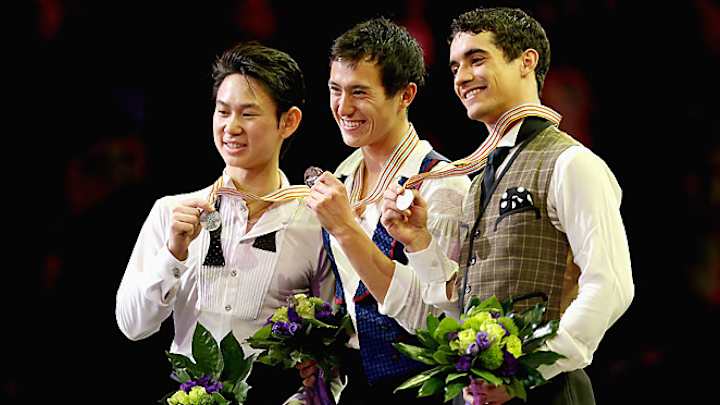Patrick Chan, Denis Ten finish closer than expected

London, Ont. -- Had Patrick Chan been a pro sports team, he'd have the been the club that built a lead of three touchdowns, 20 points, four goals or six runs before holding on for a narrow victory in the closing seconds or final inning. The Canadian favorite won his third straight men's title at the World Figure Skating Championships on Friday night after nearly spoiling a brilliant start with a disastrous ending.
In fairness, Chan, 22, had an enormous margin for error because of how well his competition had begun. On Wednesday, he skated to a world record score in a flawless and dynamic short program. The skate left him with a 6.81-point lead over Kazakhstan's Denis Ten in second place, a seemingly decisive margin. The first minute of Chan's free skate on Friday was just as impressive. He landed two quadruple jumps; first a quadruple to loop-double toe in combination and then a quad toe shortly afterward. At that point it would have taken several mistakes from Chan and a great performance by someone else to keep the home skater from hearing his anthem. Instead he almost heard the one from Kazakhstan.
Chan proceeded to fall on his next two jumps, a triple Lutz and a triple Axel, jumps he usually nails. "I never fall on my triple Lutz, even in training," he said later. "It was a battle to pick myself up after that." He landed a triple loop and double Axel later in the program, but also stepped out of two jumps in a three-jump combination and doubled a planned triple Lutz -- double toe. After completing his program, Chan slapped himself in the forehead four times before acknowledging the crowd, which was either cheering for his collective body of work or out of sympathy, but not for the sublime skate they were expecting after seeing Chan's short program. "I'm thankful for that beautiful short program I did the other day," he told the crowd in a post-skate interview that was shown on the arena scoreboard. "Maybe I'm just saving it for the Olympics."
That nearly cost him. In a sport that gave up it's base-six of perfection a decade ago, Chan was nearly upended by a perfect Ten. The 19-year-old Kazakh upstart Ten entered the final in arrears by about two jumps. But skating to Ludovic Bourne's The Artist, he started rattling off successful jumps, including two quads and five more triples. The only glitch was a doubled second jump on a triple-triple combination.
"My dream came true," Ten said. "It was not only my first world medal, but also the first for my country." It came after a series of disappointing finishes for Ten -- sixth, ninth and 12th -- that left him out of the discussion of medal favorites this season. "That wasn't me," he said. "It was hard this season to have fresh thoughts and good thoughts because of the missed jumps." Still, the season marked an enormous step forward given the lack of skating history in his country. Ten now trains in California with Frank Carroll, the coach who guided Evan Lysacek to an Olympic title in Vancouver. He spent more of his formative skating years in Russia, but began at age seven in his home country that had no indoor rinks. "It was 17 below and my mother would give me three pairs of pants," he remembers. "I looked like a cabbage. That's how I learned the double jumps. I was much quicker."
Ten still finished with the highest score in the free program and barely settled for silver, finishing with 266.48 points to 267.78 for Chan. Spain's Javier Fernandez won bronze with a distant 249.06. It was only that close because of Chan's unlikely stumbles. "I wanted to go out there and have another short program moment," Chan said. "It's selfish of me, because I wanted to enjoy it."
On the U.S. side, Max Aaron finished seventh after a respectable free skate, but Ross Miner could manage only 13th. That means that the U.S. team will have two entries in the men's competition at the Olympics in Sochi next winter instead of the three it would have had if those finishes had added up to 13 or less.
Pairs competition
A familiar country was back on top of the pairs competition as Russians Tatiana Volosozhar and Maxim Trankov took the gold medal, ahead of Aliona Savchenko and Robin Szolkowy of Germany and Meagan Duhamel and Eric Radford of Canada. The sport's traditional powerhouse has been a dominant fixture in the event. Soviet and Russian pairs won or shared gold medals at every Olympics between 1964 and 2006, before being left off the podium in 2010. Russian pairs enjoyed a similar reign at the world championships, but had not won gold at the competition since 2005, when Tatiana Totmianina and Maxim Marinin took first. U.S. pairs were well off the medals as expected. Alexa Scimeca and Chris Knierim took ninth and Miarissa Castelli and Simon Shnapir finished 13th.

Brian Cazeneuve has covered Olympic sports extensively for many years with SI and SI.com.